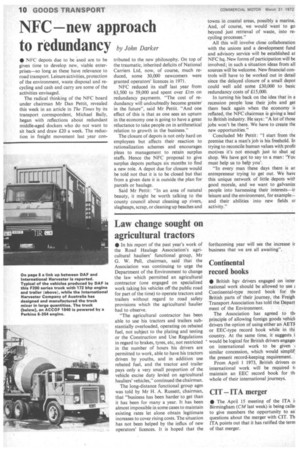NFC—new approach
Page 12

If you've noticed an error in this article please click here to report it so we can fix it.
to redundancy by John Darker • NFC depots due to be axed are to be given time to develop new, viable enterprises—so long as these have relevance to road transport. Leisure activities, protection of the environment, waste disposal and recycling and cash and carry are some of the activities envisaged. The radical thinking of the NFC board under chairman Mr Dan Pettit, revealed this week in an article in The Times by its transport correspondent, Michael Baily, began with reflections about redundant middle-aged dockers who do not want to sit back and draw £20 a week. The reduction in freight movement last year con tributed to the new philosophy. On top of the traumatic, inherited deficits of National Carriers Ltd, now, of course, much reduced, some 30,000 newcomers were granted operators' licences in 1971. NFC reduced its staff last year from 63,500 to 59,000 and spent over Elm on redundancy payments. "The cost of redundancy will undoubtedly become greater in the future", said Mr Pettit. "And one effect of this is that as one sees an upturn in the economy one is going to have a great reluctance to take people on in arithmetical relation to growth in the business. The closure of depots is not only hard on employees but affects their reaction to rationalization schemes and encourages pleas to management to retain surplus staffs. Hence the NFC proposal to give surplus depots perhaps six months to find a new role. A depot due for closure would be told not that it is to be closed but that from a given date it is outside the plan for parcels or haulage. Said Mr Pettit: "In an area of natural beauty, it might be worth talking to the county council about cleaning up rivers, slagheaps, scrap, or cleaning up beaches and towns in coastal areas, possibly a marina. And, of course, we would want to go beyond just retrieval of waste, into recycling processes." All this will involve close collaboration with the unions and a development fund and advisory service will be established at NFC hq. New forms of participation will be involved; in such a situation ideas from all sources will be welcome. New financial controls will have to be worked out in detail since the delayed closure of a small depot could well add some £30,000 to basic redundancy costs of £15,000. In turning his back on the idea that in a recession people lose their jobs and gel them back again when the economy is reflated, the NFC chairman is giving a lead to British industry. He says: "A lot of those jobs won't be there. We have to create the new opportunities." Concluded Mr Pettit: "I start from the premise that a man's job is his freehold. Ir trying to reconcile human values with profii motives it's not enough just to shut ur shop. We have got to say to a man: 'You must help us to help you'. "In every man these days there is ar entrepreneur trying to get out. We have this unique network of little depots witt good morale, and we want to galvanize people into harnessing their interests—ir leisure and the environment, for example— and their abilities into new fields ol activity."




















































































